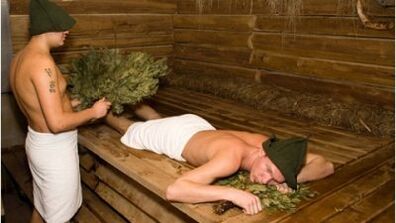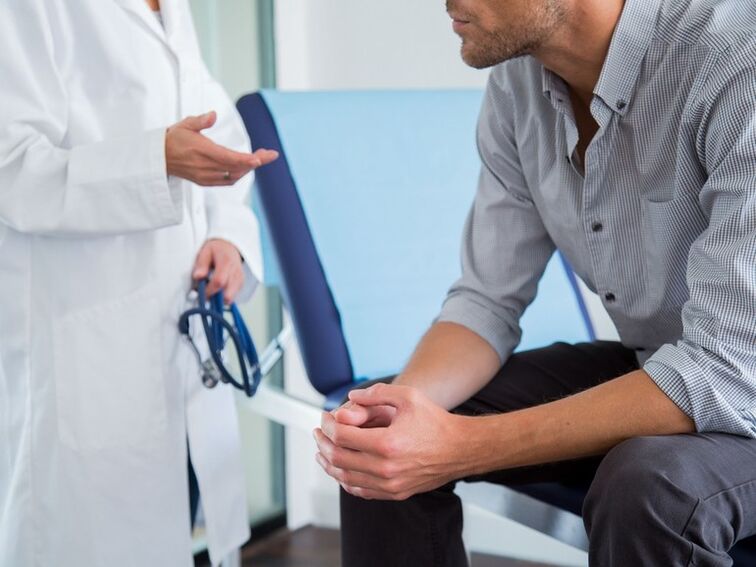Prostate inflammation, that is, the prostate, regardless of the cause of the disease, as a rule, acquires a chronic course. In order to achieve effective treatment of chronic prostatitis, you need to know for what causes it occurs.

Good health, dear readers. In connection, Alexander Burusov is an expert at the Viva Man Men's Club and we continue to understand the problem of chronic prostatitis, his causes, symptoms and treatment options.
In this article, we will try to understand what is better to treat this terrible disease, what options are at our disposal. Let's start analyzing the most modern and most effective methods for treating prostatitis in men.
What is prostatitis?
Prostatitis is called inflammation of the prostate gland. This can occur as a result of weakening of immunity, infection, hypothermia, stress, inactive lifestyle, active or, conversely, irregular sex life, entry into the body.
Iron or prostate prostate is part of the male reproductive system. This is the basis of the urethra. The size of the prostate can be compared to the size of the walnut. The main function of this organ is the development of a secret, which is responsible for the activity of sperm.
There are 4 types of diseases:
- Chronic bacterial.
- Chronic, not related to the development of bacteria.
- Chronic asymptomatic.
- Spicy.
All other types of prostatitis do not have pronounced manifestations, so diagnosing them is always difficult. The main symptoms of chronic types of disease include:

- Pain in the lower abdomen (can be given to the back).
- Disposal from the urethra (can be transparent or purulent).
- Disorders of sexual function.
- Far -heartbreaking urination.
Prostatitis can occur asymptomatic and are diagnosed only based on the test results. It can occur in a man over 25 years old. After 35 years, the risk of its development increases significantly, and in 45-year-old children the likelihood of prostatitis diagnosis is 50%. Therefore, at adulthood, it is necessary to conduct a study of the urologist annually, which will help to detect the disease at an early stage and will begin treatment on time.
Diagnosis
Only a urologist is able to determine the presence of prostatitis. After checking, he may appoint an additional exam:
- Physical examination is the palpation of the prostate, during which it is possible to determine the condition and size of the gland.
- Trarectal ultrasound.
- Analysis of the spread or secret of the prostate for the presence of leukocytes and bacteria.
- Clinical urine analysis at which protein, leukocytes and bacteria can be found.
- Ejaculate analysis.
- Cytological analysis of urine.
- Bacteriological analysis of urine.
- Analysis of the dog's protein level.
- Urodynamic examination.
- Cytoscopy. It can only be assigned if there are indications in case of injury or preparation for the operation.
Causes and exacerbation of the disease
Inflammatory diseases of the genius system, the rectum, due to close contact with the prostate gland, lead to the formation of the inflammatory focus in it. The vessels that feed the prostate are the branches of the artery of the bladder, rectum, posterior sacral artery, deep artery of the thigh. Any infectious focus available in these organs can fall into the iron.

The presence of a chronic infection of any localization, for example, the sinuses of the nose, leads to a weakening of immunity and conditionally pathogenic microorganisms available to the skin, in the intestine, urethra - become pathogenic. This leads to the development of the chronic process.
Disruption of the blood circulation of the prostate gland due to the stagnation of the blood against the background of decreased physical activity leads to a deterioration of the flow of drugs to the prostate gland and complicates the treatment of chronic prostatitis in men.
The increase in blood flow to the organs located in the pelvis happens not only because of low physical activity, but also from a number of factors:
- irregular sex life;
- interruption of intercourse;
- smoking, alcohol;
- varicose veins of the lower limbs;
- paraproctitis and proctitis;
- Thrombophlebitis hemorrhoid veins against the background of chronic hemorrhoids;
- cracks and fistulas of the anus;
- The tone of the vascular wall is regulated by the sympathetic and parasympathetic nervous system, with the disease from which the flow and flow of blood from the organ is impaired;
- Trauma to the crotch among riders, cyclists, motorcyclists.
With urogenic infections sexually transmitted, the disease does not always manage to cure - this is the cause of the development of chronic prostatitis. The most common pathogens are:
- Trichomonas;
- Mycoplasmas;
- Gonococci;
- Gardnelala;
- ureaplasma;
- Chlamydia;
- mushrooms;
- viruses;
- E. cars;
- streptococci;
- Enterococci;
- Staphylococci.

These microorganisms are difficult to cure.
Hormonal activity after 40 years in a man gradually begins to fade. At first it is asymptomatic.
Reducing testosterone production again and again leads to a slight stagnation of prostate secretion in its granules. Little by little, this stagnation is increasing. Substances contained in the secret of prostate are not completely removed. The secretory, motor, barrier function of prostate secretion begins to suffer.
Cimone acid in prostate juice performs a bactericidal function, dilutes it. With the stagnation of citric acid is not sufficient, a bacterial infection begins to develop. The level of citric acid in prostate juice is directly related to the amount of testosterone in the blood.
Clinical picture of the disease
Symptoms of chronic prostatitis in men:
- sensations of discomfort, pain over pubis;
- The pain shoots periodically in the rectum and sacrum;
- increased urination and pain, especially after hypothermia, stress;
- uncharacteristic discharge;
- ejaculation disorders, erection;
- premature ejaculation;
- increased sweating;
- disturbed sleep;
- Periodic increase in body temperature not more than 37. 2-37. 3 0 C in the evening.

What symptoms prevail: pain, urination or sexual dysfunction - the treatment of chronic prostatitis in men depends.
The main components of the treatment of the disease
It is necessary to emphasize the main areas of treatment:
- medicines;
- normalization of the mode of work and rest;
- rational nutrition;
- rejection of bad habits;
- Phisolisation, massage;
- Folk remedies.
Medication
Effective treatment of prostatitis should be aimed at eliminating the cause of prostatitis. Medicines are selected individually by a doctor after performing the necessary diagnostic studies. Let's analyze how and how to treat prostatitis if it has already acquired a chronic form. The main directions of drug therapy:
- antibiotics;
- anti -inflammatory drugs;
- antispasmodics to improve urine leakage;
- Uraniums to eliminate urinary system infections;
- preparations that improve arterial and venous blood streams;
- Drugs that improve smoothness, reduction of blood viscosity;
- vitamins;
- enzymes;
- sedatives, psychotherapeutic effects;
- Correction of immune disorders;
- Treatment of metabolic diseases and hormonal dysfunction.
Antibacterial therapy
Whether we treat chronic prostatitis, it will depend on a well -detected antibacterial therapy. It is important to note that the therapy and treatment of prostatitis will only be as effective as possible in the case of proper determination of the type and stage of the disease.
Antibiotics are chosen by those who penetrate the prostate well, effectively act on the pathogen. Some pathogens of chronic prostatitis, such as ureaplasm, are not sensitive to such strong drugs as:

- tetracycline;
- some cephalosporins;
- Levofloxacin;
- Clarithromycin.
Non -steroidal anti -inflammatory drugs
The effect of non -steroidal anti -inflammatory drugs (NSAIDs) is related to the normalization of the permeability of the vascular wall, the restoration of microcirculation. They reduce education and do not allow existing inflammation mediators to be absorbed. We need to remember the property of the NSAIDs, to form ulcers in the stomach and duodenum.
It is most rational to use rectal candles with NP, such as indomethacin.
Normalize blood flow with medication
The normal blood flow is achieved with an adequate diameter of the arteries, which brings the blood into veins that are beyond the outflow of oxygen blood. It is also necessary to reduce the viscosity of the blood and to achieve its good smoothness in the capillary canal.
In order to achieve a good result in the treatment of chronic prostate diseases, it is necessary to treat inflammatory diseases of the urethra, bladder and kidneys. Medicines are used for this purpose:
Prostatitis inevitably reduces potency, weakens libido, disrupts erection. These phenomena are always accompanied by symptoms of dysphoria, reduced mood background and mood swings. These symptoms prescribe sedatives, anxiolytics and antidepressants.
Phytotherapy
Herbal medicine is known to be an alternative to the use of medicines in the treatment of many diseases. Is it possible to cure prostatitis with its help? Very often, in order to improve metabolic processes in the prostate, doctors recommend using medicinal herbs (lifting, nettle, peony, plantain, St. John St. John, etc. ). All these plants contain a lot of selenium and zinc. However, they should only be used as part of complex therapy. As a rule, decoctions of these herbs are used for baths.
Physiotherapy influences
The following methods of treating the chronic process are used to influence the prostate:

- ultrasound
- electrophoresis;
- Hot water baths with decoction of chamomile, lindzhi, sage, thyme;
- Warm enemas
- Prostate massage through the rectum;
- Survivorotherapy
- UHF;
- inductothermia;
- Microwave resonance therapy.
The severity of psychological abnormalities and depressive manifestations depends on how much chronic prostatitis is treated. In order to accelerate the treatment process, physiotherapy methods of exposure must be added in the absence of contraindications.
Eating recommendations
Standard recommendations for all chronic diseases in the form of refusal of fried, salty, praised, smoked in this situation are insufficient. Effective treatment of prostatitis depends on a rational, balanced diet. It is necessary to add such foods such as celery, ginger, turmeric, apibodes.
They contain:
- silicon, which normalizes the formation of hormones in the body;
- In vitamins, remove toxins and restore the redox processes;
- Chromium, germanium, selenium, zinc normalize the work of a sympathetic and parasympathetic system;
- Vitamins C and normalize the permeability of the cell membrane, have antioxidant properties;
- Extremely amino acids, omega 3, which rejuvenate sexual function.
Apitherapy uses: natural honey, pegs, bag, royal jelly, dead bees, bee pollen.
Folk treatment
The course of treatment of chronic prostatitis is supplemented by medicinal herbs, which should take into account all these mechanisms for the development of the disease. Then the effect of therapy will be fully achieved.
The following medicinal herbs may be used:
- Nettle, sage, stubborn;
- Mint, Plantain, Hernica;
- Rose, Yarow, Pelin;
- Thyme, birch buds, linds of flowers;
- Successfully drowned, chamomile, mothers.
The treatment of chronic prostatitis depends on the prolonged use of medicinal herbs according to the regimen in combination with contradictory courses of drug therapy.

Decoction are used, oral infusions, baths, micro -cell. The administration of tinctures, that is, alcohol -containing drugs are not recommended. This prevents the successful treatment of chronic urogenital diseases.
All these drugs have a good effect in the treatment of prostatitis in inflammatory, stagnant, hormonal etiology.
Prevention
It will be better to cure prostatitis will tell a urologist after a patient examination. But like any other disease, prostatitis is easier to prevent than getting rid of the effects of the disease. This is necessary:
- Lead an active lifestyle. Regular sports prevent stagnation phenomena in the pelvis and improve blood circulation. The good effect has: swimming, sports walking, dancing, fitness. At the same time, power sports should be avoided.
- Provide proper nutrition. It is worth limiting the amount of fried, salty, oily, spicy, marinated and smoked food. The basis of the diet should be: fresh vegetables and fruits, dairy products, cereals. It is important to stick to the drinking regimen.
- Avoid accidental sexual relations.
- Keep a regular sex life. For a male male, the norm is sex several times a week. This contributes to natural prostate massage, which significantly reduces the risk of spreading it from different bacteria.
- It is important to avoid hypothermia.
- It is necessary to undergo a urologist exam each year.
After 35 years, each person is obliged to monitor their health, as during this period the risk of prostatitis increases. In order to prevent the onset of the disease, it is important to perform simple preventive measures and regularly undergo a medical examination that will help to identify the pathology at the initial stage when it is easy to cure.






























